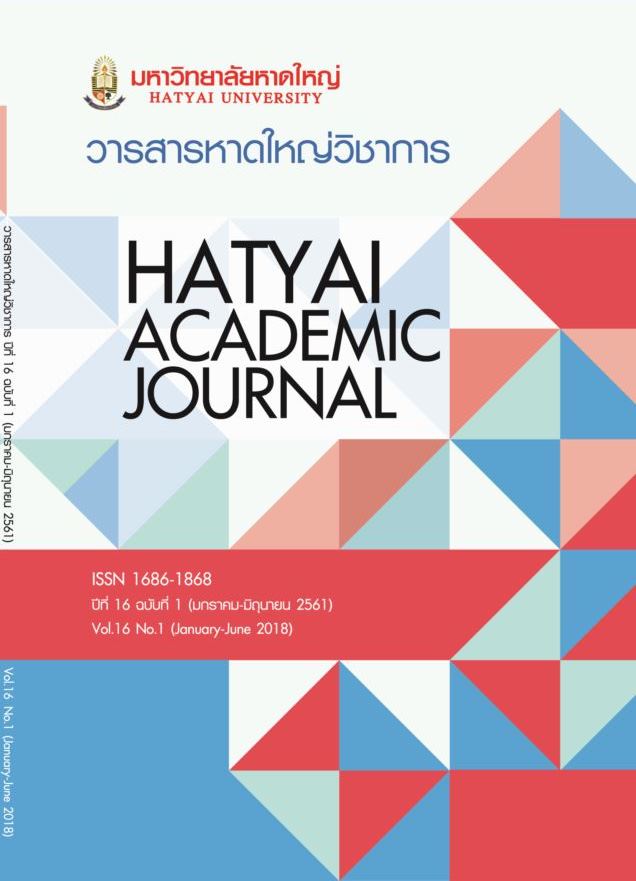The Implementation of CEFR in the Thai Education System (การใช้กรอบอ้างอิงสมรรถนะด้านภาษาแห่งสหภาพยุโรปในระบบการศึกษาไทย )
Main Article Content
Abstract
This article demonstrates the implementation of “The Common European Framework of Reference for Languages,” or CEFR, in the Thai education system between the low quality of education and low proficiency of English. It explores significant issues like the English proficiency of Thai students, definitions and frameworks of CEFR, the necessity of CEFR, the implementation of CEFR in Thailand, studies on the utilization of CEFR, and the major impact of CEFR in Thailand. This article is intended as a rich source of information for all sectors in educational management, particularly English proficiency improvement, and could be also directly used as guidelines for developing the quality of both teachers and students.
บทคัดย่อ
บทความฉบับนี้จัดทำขึ้นเพื่อนำเสนอการใช้กรอบอ้างอิงสมรรถนะด้านภาษาแห่งสหภาพยุโรปในระบบ การศึกษาไทยในท่ามกลางคุณภาพด้านการศึกษาและสมรรถนะด้านภาษาอังกฤษที่ตกต่ำ ผู้เขียนบทความสำรวจประเด็นที่สำคัญอันได้แก่สมรรถนะด้านภาษาอังกฤษของนักเรียนไทย ความหมายและขอบข่ายกรอบอ้างอิงสมรรถนะด้านภาษาแห่งสหภาพยุโรป ความจำเป็นของกรอบอ้างอิงสมรรถนะด้านภาษาแห่งสหภาพยุโรป การใช้กรอบอ้างอิงสมรรถนะด้านภาษาแห่งสหภาพยุโรปในประเทศไทย งานวิจัยด้านการใช้กรอบอ้างอิงสมรรถนะด้านภาษาแห่งสหภาพยุโรปทั้งในและต่างประเทศ และผลกระทบจากการใช้กรอบอ้างอิงสมรรถนะด้านภาษาแห่งสหภาพยุโรปในประเทศไทย โดยบทความนี้จะเป็นแหล่งข้อมูลที่เป็นประโยชน์ต่อทุกภาคส่วนในด้านการจัดการทางการศึกษา โดยเฉพาะอย่างยิ่งการปรับปรุงสมรรถนะด้านภาษาอังกฤษ อีกทั้งยังสามารถใช้เป็นแนวทางโดยตรงสำหรับการพัฒนาคุณภาพของทั้งบุคลากรครูและนักเรียนต่อไป
Article Details
All published articles are evaluated by three qualified peer reviewers from various institutions through a double-blind process, where reviewers do not know the authors’ identities and authors do not know the reviewers’ identities. The content and articles in the Hatyai Academic Journal reflect the authors’ views only and are neither the opinions of the editorial board nor the responsibility of Hatyai University. The Editorial Board of the Hatyai Academic Journal allows articles to be reproduced for academic purposes, on the condition that the original source is clearly cited.
References
British Council. (2016). CEFR in Thailand. Retrieved from https://www.britishcouncil.or.th /en /teach/ our-work/cefr-thailand
Bureau of the Budget. (2016). Thailand’s budget in brief fiscal year 2016. Retrieved from https://www.bb.go.th/budget_book/eBook2559/FILEROOM/CABILIBRARY59/DRAWER01/
GENERAL/DATA0000/inBrief2016.pdf
Cambridge English.(2016). International language standards. Retrieved from https://www.cambridgeenglish.org/exams/cefr/
Chen, Y. H., Mohammadi, S., & Benigno, V. (2013). What and How Many Words Do We Need? Critical Considerations when Developing a CEFR Vocabulary List: Size, Depth, and Growth. Retrieved from https://uahost.uantwerpen.be/linguapolis/LT-CEFR2013/Book%20of%20Abstracts%20%27 Language%20Testing%20in%20Europe%20-%20Time%20for%20a%20New%20Framework%27.pdf
Chongdarakul, W. (2015). The Development of the Curriculum of Listening Development Aligning with CEFR for English Language Teachers under the Supervision of the Office of the Basic Education Commission. Retrieved from https://tdc. Thailis.or.th/tdc/browse.php?option=show&browse_type =title&titleid=428592&query=cefr&s_mode=any&d_field&d_start=0000-00-00&d_end=2560-02-11&limit_lang=&limited_lang_code=&order=&order_by= &order_type=&result_id=1&maxid=2
Corrigan, M. (2013). Interchangeability of Test Results and the CEFR – a Validity. United Kingdom: University of Bedfordshire Cambridge.
Council of Europe. (2015). Education and Languages, Language Policy. Retrieved from https://www.cambridgeenglishteacher.org/what_is_thishttps://www.coe.int/t/dg4/ linguistic/cadre1_
en.asp
EF English Proficiency Index. (2016). Proficiency Trend. Retrieved from https://www.ef.co.th/epi/regions/ asia/thailand/
Educational Management Information System Centre. (2016). Reform and Modernization. Retrieved from https://www.moe.go.th/main2 /article/e-hist01.htm
Frederickson, T. (2015). Thailand’s English skills lagging, says training company. Retrieved from https://www.bangkokpost.com/learning/learning-news/756536/thai-english-proficiency-drops-now-3rd-worst-in-asia-ef
Intathep, L. (2014). European standards set for language. Retrieved from https://www.bangkokpost.com/news/local/399060/european-standards-set-for-language
James B. (2015). Thai English proficiency drops, now 3rd worst in Asia – EF. Retrieved from https://ielts-academy.com/blog/thai-english-proficiency-drops-now-3rd-worst-in-asia-ef-bangkok-post/
Ketamon, Th. (2016 a). A Study on the English Proficiency of English Teachers in Pattani Primary Educational Service Area Office 1, Thailand, through the CEFR Assessment Test. In Asst. Prof. Dr. Praypte Kupgarnjanahoo (Chair), RSU International Conference 2016. Suratthani Rajabhat University, Thailand.
Ketamon, Th. (2016 b). A Study on the English Proficiency of Senior High School Students in Lower Southern Thailand through the CEFR Assessment Test. In Asst. Prof. Ruja Tipwaree (Chair), University Through Diversity, Language, Communication and Innovation in Multicultural Contexts. Rajamangala University of Technology Srivijaya, Thailand.
Mala, D. (2016). ASEAN Aseannity challenges Thai English skills. Retrieved from https://www.bangkokpost.com/learning/learning-news/813852/asean-community-challenges-thai-english-skills
Martyniuk, W. (2011). Aligning Tests with the CEFR. Edinburgh: Cambridge University Press.
Morrow, K. (Ed.). (2004). Insights from the Common European Framework. Oxford, England: Oxford University Press.
Nagai, N., & O’Dwyer, F. (2011) The actual and potential impacts of the CEFR on language education in Japan. Retrieved from https://gerflint.fr/Base/Europe6/noriko.pdf
Office of The Basic Education Commission, The Ministry of Education. (2014). Policy of English Language Teaching and Learning Reformation. Retrieved from https://english.obec.go.th/index.php /download
Office of The Basic Education Commission. (2015). Development of English Language Teaching and Learning. Retrieved from https://english.obec.go.th/english/2013/index.php/en/10-2012-08-08-06-17-33/2012-08-08-06-17-52/120-2015-09-23-08-34-56
Office of the Minister. (2016). Office of the Minister News. Retrieved from https://www.thaigov.go.th/index.php
Promduang, P. (2016). Assessing Language Skills of DRIC Freshmen to Design an English Intensive. Course underlying CEFR. In Asst. Prof. Dr. Praypte Kupgarnjanahoo (Chair), RSU International Conference 2016. Suratthani Rajabhat University, Thailand.
Teng, B., & Sinwongsuwat, K. (2015). Teaching and Learning English in Thailand and the Integration of Conversation Analysis (CA) into the Classroom. English Language Teaching, 8(3), 1-23.
Schwab, K. (2016). World Economic ForumThe GlobalCompetitiveness Report 2015–2016. Geneva: Columbia University.
Sinlapachai, R., Surasin, J., & Augkanurakbun, R. (2016). The use of online standardized tests as indicators of English proficiency according to the common European Framework of Reference (CEFR) at the English program of Chonkanyanukoon School, Chon Buri, Thailand. HRD Journal, 7(1). 63-72.
ThaiLIS. (2017). Searching Result for CEFR. Retrieved from https://tdc.thailis.or.th/tdc/ search_result.php
The Ministry of Education. (2014). The Ministerial Announcement. Bangkok: Jamjulee Product Ltd.
Tylor, L. (2004). Issues of test comparability. Research Notes, 15, 2-5.
Vanijdee, A. (2009). Development of an Online Reading Test. Retrieved from ww.stou.ac.th/Schools/Sla/upload.
Wachter, L. D., & Heeren, J. (2010). Can a Language Test Verify the Academic Literacy of University Students and how Does that Relate to Study Success? Retrieved from https://uahost.uantwerpen.be/linguapolis/LT-CEFR2013/Book%20of%20Abstracts%20%27Language%20Testing%20in%20Europe%20-%20Time%20for%20a%20New%20Framework%27.pdf
Wanachayanont, Ch. (2015). Assessing English Teachers. Retrieved from https://www.cambridgeenglishteacher. org what_is_thishttps://blog.eduzones.com/Chayapa/141406, 2015
Weir, C. J. (2005). Language testing and evaluation: an evidence-based approach. Basingstoke: Palgrave
Macmillan.


